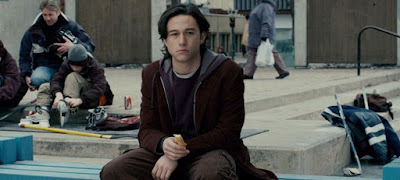or
"No...But, Yeah."
Emily Benetto (Aubrey Plaza) is applying for a job, office work. Pleasantries. Resume Glance-Over. Good, so far. Smile, smile.
Then, the interviewer brings out her background check. There's that DUI a few years ago. Then, there was the aggravated assault charge just a couple years back. Then, a nerve twitches in her right cheek and the eyes start to blink and come back narrowed. The smile turns into a sneer and Emily goes on the attack.
How did he get her background info? He must have known about it the whole time! Why the charade of even having an interview if he had that information? Why, if she can't trust him about that, how can she trust him about anything? How could he be so deceitful? Well, the interview is over and she goes stalking out. Oh, and, by the way, she takes her background information file with her, even though it's probably available to anyone who asks.Fuming, Emily goes back to work. Gig work. She's a delivery-driver for buffet meals for events, with lots of heavy-lifting and stairs if there are no elevators. It's mechanical and she doesn't have to interact with the public, as they wait like cattle for the toughs to be filled. She has $70,000 worth of school debt (art major), which she'll never be able to pay off at this rate and that record keeps her from getting steady employment. There's no statute of limitations and she's stuck. A couple mistakes and her life is hosed and she has to content herself with work anybody can do (if they don't ask questions) and rooming with strangers just to have a roof over her head. The system is against her and there's no way of getting out of it. Welcome to America in the 21st Century.
Emily bumps into a co-worker in a jam—he's promised to go to his kid's baseball game and can't make a delivery, so Emily takes it. As thanks, he gives her a phone number for a job that pays $200 for one hour's work. She calls the number and the phone-call is rather sketchy: she's given an address and a time to be there. Just in case, she checks her bear-spray. At least, that's working.
Emily bumps into a co-worker in a jam—he's promised to go to his kid's baseball game and can't make a delivery, so Emily takes it. As thanks, he gives her a phone number for a job that pays $200 for one hour's work. She calls the number and the phone-call is rather sketchy: she's given an address and a time to be there. Just in case, she checks her bear-spray. At least, that's working.
It's a run-down warehouse space, and she's told to hand over her I.D. She does so, reassured that she'll get it back. She then goes into the backroom where another 25 people are waiting, and when things start, the guy has one question: he says that they'll be making $200 in cash, but what they're going to be doing is illegal. If you have a problem with that, get out. The job is dummy-purchasing. They are going to be handed credit cards and the job is to go in and buy a big-ticket item, like a wide-screen TV. Pay for it with the credit card and leave, and meet at a secure location. "Are the credit cards stolen?" "No, but the information on them is." "What if they check my I.D.?" They hand her a driver's license with her picture on it." "Is that you?" She pulls off the job and is immediately handed $200 in cash. "We have another job and it pays $2,000." She tentatively agrees.
Emily the Criminal is a lean and mean crime drama about the black market that sits just under the skin of everyday life. You know it exists. You might even be taking advantage of it. It might even be taking advantage of you if your information has been hacked or your credit cards stolen. It uses the cracks in our system for the sake of convenience and using it against entities who will be writing off the losses anyway. The losses are societal, absorbed in rising insurance costs and anonymous fraud charges. Out of sight, out of the ledgers. The companies and the banks and the credit companies know all about it, but there is nothing they intend to do about it, as accepting the loss is cheaper than what it'll cost to get used product back.
For Emily, it's a chance to get her head above water and maybe, eventually, get out of the grind. But every gig has its own grind that sand-papers the nerves down, and pretty soon, she has to contend with bad actors, theft, threats, and even murder, but she takes it in stride. She's built up so much bitterness for "The System" that's kept her down, that, at least now, she's in a fair fight, and it's survival of the fittest.
One can't say enough about Plaza in this movie. She's always been freakishly good, like an adult version of Wednesday Addams, on a track by herself, that very few other actors could pull off. But, here, there's something dead behind the eyes that convinces you that she could do the things she does and be the person who will do what it takes to survive. It's her movie and she's in almost every frame, leading the camera along as she descends into the underworld. The film, in its spareness, has an old Warner Bros. gangster quality to it and it packs an ironic punch along the lines of I Was a Fugitive From a Chain-Gang.
It's visceral. You'll come out more direct, more brittle, and more arrogant, and amazed that this little film with the limited budget and cast can affect you, piercing the complacency and making you more raw. And just a little meaner.


















































